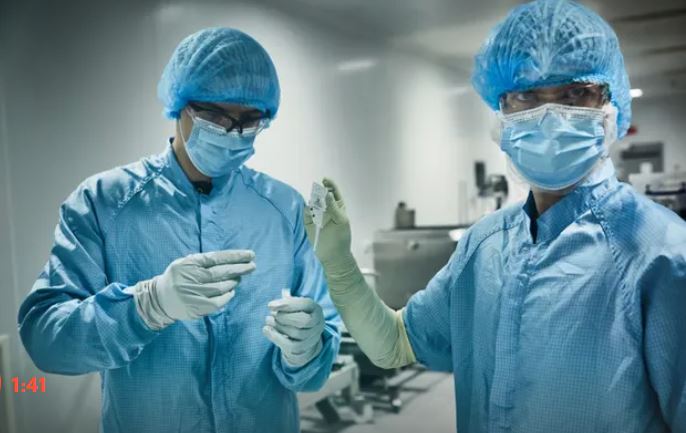Oxford/AstraZeneca vaccine rollout plan changed following approval
Concern over a move to give millions first jab with a wait of up to 12 weeks for the second dose
Millions of people across the UK at risk from Covid will be offered a single first dose of the Oxford/AstraZeneca vaccine, with a booster jab within three months, in a bid to return the country to some normality by the spring, the prime minister has said.
The rollout of the Oxford vaccine will begin on 4 January following its approval for emergency use by the Medicines and Healthcare products Regulatory Authority (MHRA). The government hopes the vaccine, of which it has ordered 100m doses, will transform prospects in the UK and check the spread of the rampaging coronavirus variant which has caused cases to surge. Pharmacies as well as GPs will be able to give the jabs to those at risk.
But the MHRA and the government’s advisory Joint Committee on Vaccinations and Immunisation delivered a surprise by announcing approval of a regime that was not trialed. Both the Oxford vaccine and the Pfizer/BioNTech jab which is already in use will be given to people as one shot, followed by another up to 12 weeks later, in order to extend some protection to as many people as possible as quickly as possible.
Boris Johnson said at a Downing Street press conference that the benefits from the vaccine would kick in within 21 days. “What that means is we can vaccinate and protect many more people in the coming weeks,” he said.
He hoped that by the spring of 2021, many coronavirus restrictions would be able to be lifted. “If we’re right and the vaccination program does have the positive effects that we think it can have, and I stress these are ifs, then clearly a lot of the non-pharmaceutical interventions … will recede into the past,” he said. “We’ll be able to do things very differently.”
The prime minister added that the public may need to carry on with “basic disciplines” such as washing hands and wearing masks “for a while after”.
The approval of the vaccine by the MHRA after weeks of examining trial data was greeted with excitement and relief by experts. The Pfizer/BioNTech vaccine already in use needs to be stored in the long-term at -70C and is hard to deploy. The Oxford vaccine, however, can be kept in a normal fridge at 2-8C and is easily transported from UK factories, meaning it will not have to be kept in central hospital and community hubs, enabling a swift rollout to GP practices and care homes.
Amid the widespread praise for Oxford University and AstraZeneca in gaining UK approval for a vaccine that is vital to the global prospects of ending the pandemic because of its low cost and normal refrigeration, some experts were anxious at the proposed mode of use. They said it was pragmatic to try to ensure as many people as possible had the first shot, giving them some protection, but that there were unanswered questions. These include the evidence for extending the time between injections to 12 weeks, which could lead to some people not returning for the second dose.
Pfizer/BioNTech said that their vaccine was not designed to be used in two shots 12 weeks apart. In a statement, the firms said there was no evidence the first shot continued to work beyond three weeks.
“Data from the phase 3 study demonstrated that, although partial protection from the vaccine appears to begin as early as 12 days after the first dose, two doses of the vaccine are required to provide the maximum protection against the disease, a vaccine efficacy of 95%. There are no data to demonstrate that protection after the first dose is sustained after 21 days,” they said.
The decision to approve the Oxford/AstraZeneca vaccine followed “rigorous clinical trials and a thorough analysis of the data by experts at the MHRA, which has concluded that the vaccine has met its strict standards of safety, quality and effectiveness”, the DHSC said.
AstraZeneca said its vaccine would be made available to some of the poorest regions of the world at a low cost and was not being manufactured for profit.
Talking to BBC Radio 4’s Today program, its chief executive, Pascal Soriot, said the company could provide the UK with as many as 2m doses a week and would start shipping the first doses “today or tomorrow”.
He said: “Vaccination will start next week and we will get to 1m a week, and beyond that a week, very rapidly. The good news with this is we are going to be able to inject a lot of people with one dose very quickly, provide them with a reasonably good dose of protection until they get their second dose two to three months later. That will enable us to protect many more people because we can wait two to three months for the second dose.”
Matt Hancock, the UK health secretary, said every adult in the UK could eventually be offered vaccination.
Speaking to BBC Breakfast, he said: “Because we’ve got enough of this vaccine on order to vaccinate the whole population – we’ve got 100m doses on order – add that to the 30m doses of Pfizer and that’s enough for two doses for the entire population.
“So I can now say with confidence that we can vaccinate everyone, except of course for children because this vaccine has not been trialed on children, and anyway children are much, much less likely to have symptoms from the disease.”
Appraisal of the Oxford vaccine has taken longer than it did for the Pfizer/BioNTech product, which the UK was the first country to approve on 2 December. The dossier of testing and trial results for the Oxford vaccine was more complicated.
Pfizer/BioNTech, whose vaccine is based on novel mRNA technology, had clear results, with 95% efficacy from a single international trial involving 43,000 people. Oxford/AstraZeneca had 62% efficacy in their largest trial, of 11,636 people, but 90% efficacy in a small additional sub-group in the UK numbering 2,741 who were given half a dose of the vaccine followed by a whole dose four weeks later.
The MHRA in effect dismissed the finding from the trials that there was 90% efficacy in that subset, which was made up of fewer than 3,000 people in the UK, who were mostly under the age of 55, so was not typical of the population’s most vulnerable. However, the MHRA said it was not the age of the participants that caused the high efficacy rate. Instead, it suggested it may have been because there was a longer gap between the administration of the first and second doses of vaccine. More details of their assessment were to come, the authority said.
Overall, the MHRA said, the efficacy of the vaccine reached about 70% between three weeks and 12 weeks, when given as a single standard dose. The second dose, not later than 12 weeks afterward, was necessary because the effect may not last without the booster shot, it said.
The MHRA acknowledged there was limited data on the effects of the vaccine in elderly people. Ongoing trials in the UK and US will supply more evidence, but it said it was satisfied the vaccine was safe and effective in the older population.
The researchers have pointed out that none of the volunteers in the trials who had the vaccine became seriously ill or were admitted to the hospital.
Prof Andrew Pollard, the director of the Oxford Vaccine Group and the chief investigator of the Oxford trial, said: “The regulator’s assessment that this is a safe and effective vaccine is a landmark moment and an endorsement of the huge effort from a devoted international team of researchers and our dedicated trial participants.
Source: https://www.theguardian.com/society/2020/dec/30/oxford-astrazeneca-covid-vaccine-approved-by-uk-regulator?utm_term=f023cc4a46a706145b43ed2325b28756&utm_campaign=GuardianTodayUS&utm_source=esp&utm_medium=Email&CMP=GTUS_email




